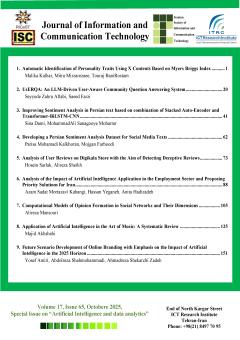JICT endorses the guidelines of the Committee on Publication Ethics (COPE). Please follow the items listed:
Overview
This policy is a guide to the process of publication of our journal. JICT publication follows the policy of the COPE as far as possible. COPE - Committee on Publication Ethics
Authorship
The authors have a high proportion in explaining and describing the contents of the data, and other things mentioned in the article. They should respond to all the possible raised questions. COPE-flowcharts on Authorship and contributorship
Acknowledgment
The authors should appreciate the journals, resources, organizations, and individuals whose information and assistance were employed during the research process.
Changes in authorship
Any change in the paper can be applied by the authors through submitting a written application to the publishers and providing the required documents.COPE – flowcharts on Changes in Authorship
Submission of manuscript
Authors should read the “Instructions for Authors” on the journal’s webpage before making a submission. The manuscript should be prepared according to the style and specifications of the journal’s policy. Authors listed on the manuscript should have met the requirements for authorship specified above. Where possible, the contribution of each of the authors should be specified as well.
Conflicts of interest
Authors should complete a “conflict of interest form” (in Farsi site of the journal). Authors should disclose all the financial/relevant interest that may have influenced the development of the manuscript. Reviewers are committed to disclose any conflicts of interest, and if necessary, reject to review any manuscript they perceive to have a conflict of interest. Editors reject any manuscript that may have a conflict of interest.
COPE - flowcharts on Conflict of Interest
Confidentiality
Articles are considered as a confidential document, and the publishers, editorial board, and reviewers should try to maintain the confidentiality. To view more items, please refer to the following link: COPE Guidelines and COPE Flowcharts
Peer review
Basic principles to which peer reviewers should adhere to:
• Only review the manuscripts for which they have the subject expertise or those required a proper assessment and which they can assess in a timely manner.
• Respect the confidentiality of peer review and not reveal any details of the manuscript or its review during or after the peer-review process, beyond those that are released by the journal.
To view more items you can refer to the following link: COPE peer review process
Complaint Process
This in the right of any author to have complaints about policies, procedures, or actions of the journal’s editorial staff. The complaints are more welcome to us because they provide an opportunity and a spur for improvement, and of course we will follow up the complaints as soon as we could in a polite and positive tone.
The best way to reach us is by email. The complainant should send an Email with full description and evidences to jouraict@gmail.com.
As the editorial office received a complaint it will move to daily duties automatically. Then editor start an investigation process that may take up to three days. Then a meeting will hold about the complaints and the proper will be taken and send the decision to the complaint by Email.
Copyright, Misconduct and Plagiarism
Any misconduct and violations by the researchers or authors are not overlooked. Refer to the following link in case of observing any suspected cases: COPE Allegations of misconduct
Articles published in this journal are under international license (Creative Commons Attribution CC-by SA).
Therefore, the copyright of the article has been transferred to the journal and the author can use the article under the above license. This license, which is used by many open access journals, allows the use of articles subject to citation.
It should be noted that in order to protect copyright and prevent plagiarism, the journal uses similarity software in the initial review and in the process of judging articles, and in case of more than 30% similarity with previous existing references, the article will be rejected.


